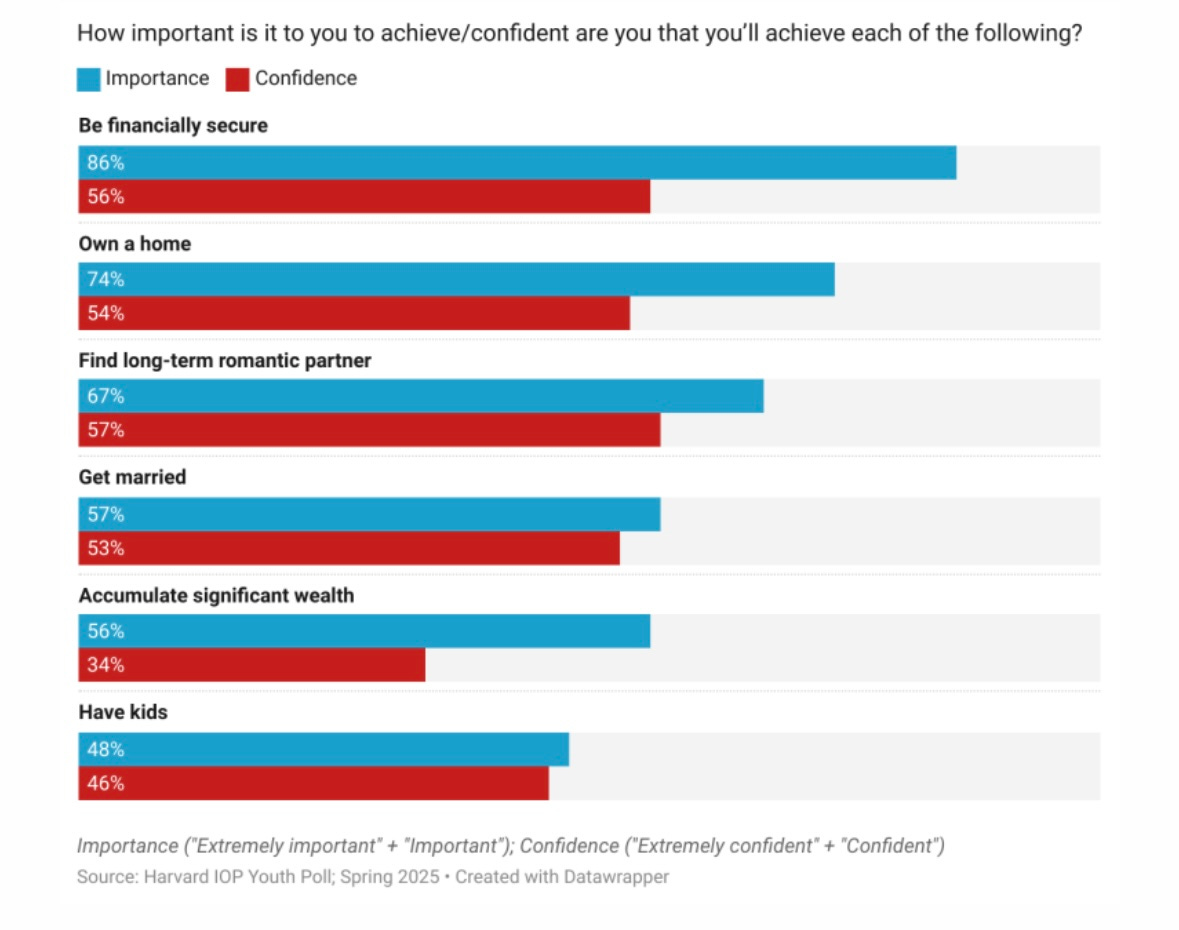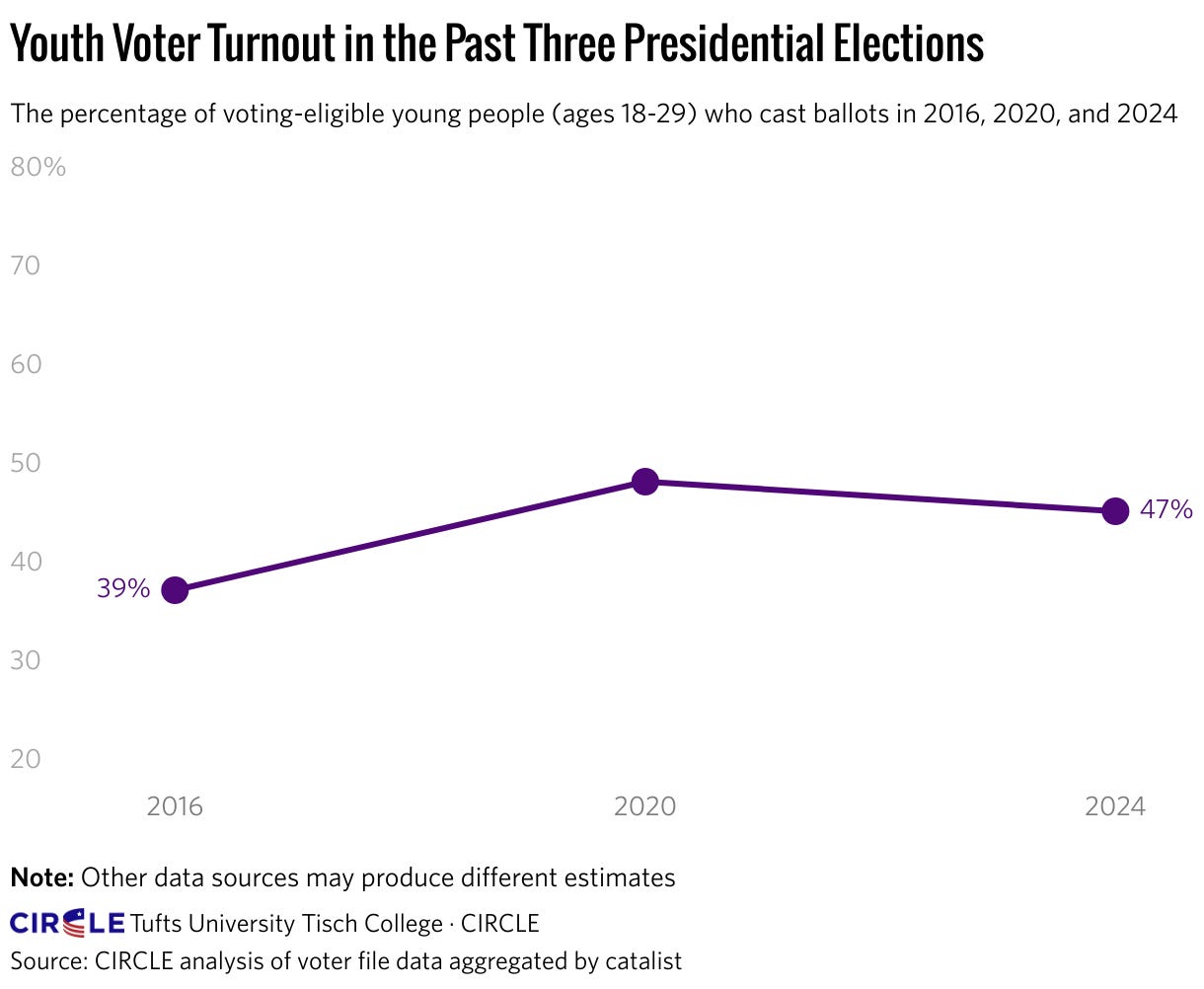A generation in crisis
Just 48% of young Americans say having kids is important, other takeaways from the Harvard IOP Youth Poll, and "the Democrats secret weapon" stuns on the 'Flagrant' pod.
The Harvard IOP released its 50th Youth Poll yesterday and the results reveal a generation is in crisis. Young adults under 30 are barely keeping up financially, don’t feel a strong sense of community or belonging, and aren’t gung-ho on having kids.
The data is bleak.
As a result, their vision of the American Dream is changing. What stood out to me most is the fact that just 48% of the young adults ages under 30 polled say having kids is important to them. Having kids ranked lowest on a list of ‘life goals’ asked about in the recent survey.
Topping the list is achieving financial security, with 86% of young adults saying it’s important to them.
Interestingly, the youth pollsters asked not only how important these ‘life goals’ are to the young people surveyed, but they also asked how confident the young adults are in their ability to achieve the goals laid out.
The difference in importance and confidence was the smallest for having kids, and largest for financial security – showing a stark difference in young people’s prioritization of goals and whether or not they actually think the goal is doable.
Take a look here:
Relatedly, more than 4 in 10 young Americans under 30 (42%) say they’re struggling financially. That share is even greater for women (47%), non-college young people (50%), and young people of color (45% for Black young adults and 52% for Hispanic young adults).
When it comes to community, young people are missing out. On the whole, less than half of young people (just 43%) say they feel connected to community and 30% say they either feel no strong sense of belonging or are still in search of one.
To get more behind the scenes insight on the poll, I called Rachael Dziaba, a 21-year-old junior at Harvard and the senior researcher behind the survey. While she said that the team behind the poll of course doesn’t know why less than half of young Americans say having kids is important to them, she could see multiple factors playing into the share reported.
“I would hesitate to say it’s just one thing,” Dziaba told me. “Financial stability could affect that, but I think it also could be concerns about the environment, or also just personal autonomy and choice, and the fact that young Americans now are growing up in a world where they do have the choice more than ever, especially young women, whether or not to have children.”
“There is always going to be some people who just simply don't want kids, and if they have the option now not to have them, they won't,” she added.
“I've had a lot of candid conversations with people about concerns about having kids and being able to have the career life that they want. And so I do think that even if people want kids, there's concerns about being able to have a career, being able to balance the two. There are a lot of people who feel that society is pressuring women to do both, to do everything. And I definitely think that could play into it,” Dziaba said.
As for the current political climate, the poll found that President Donald Trump’s policies are, on the whole, unpopular with young people (and his approval rating with young people of 31% stands roughly where it did at this time in the spring of 2017, when it was 32%, and fall of 2020, when it was 29%).
But while that may seem like a good sign for Democrats, their brand is awful amongst young Americans. The survey shows that young people’s approval rating of Democrats in Congress — which stands at just 23% — has dropped a whopping 25 points since the fall of 2020, when it was at 48%. The Democratic Party’s work is cut out for them – to say the least.
So what?
I find the macro-level findings about what young people are craving and prioritizing far more telling about their political appetite than any Trump or Dem-related metrics.
This generation has grown up amid constant crises and each day – with economic uncertainty, global geopolitical conflict, and a virtual reality that is disconnected from IRL community – feels heavier and heavier.
When it comes to politicians and leaders looking to resonate with young people, you need to level with young people. Address their lived experience and feeling of frustration or struggle head on before offering up any plan for the future. And any conversation about a plan for the future must acknowledge missteps of the past.
But despite the gloom and doom that this poll presents, I’m not hopeless.
An updated analysis on 2024 youth voter turnout from the Center for Information & Research on Civic Learning and Engagement at Tufts shows that 47% of young people voted in 2024, which is roughly on par with youth voter turnout of 2020, when 50% of young people voted (a historically high year).
This generation is fed up but not giving up. And they’re tapped in, perhaps, because of the chaos they continue to face.
Pete Buttigieg and his ‘Flagrant’ cameo
Former Transportation Secretary and Mayor of South Bend, Indiana, Pete Buttigieg, sat down this week for a nearly 3-hour-long episode of the Flagrant podcast, a massively popular show that Trump went on during his podcast tour last fall. The show has nearly 2 million subscribers on YouTube alone.
Buttigieg talked policy issues from taxes, to tariffs, and immigration and Democrats' bad habit of "finger wagging.” But he also got really personal, discussing how he came out and a “just in case” letter he wrote before being deployed to Afghanistan, fatherhood, and raising Black children as a white man. For all the serious chatter and banter throughout the episode, it starts with a conversation about The White Lotus (no spoilers here).
There’s been a very positive reaction (at least so far as I can tell) to his cameo on the popular podcast – and at the start of the episode, Andrew Schulz, the show’s host, called Buttigieg "the Democrats secret weapon.”
Replying to a post on X from my friend Rotimi Adeoye praising Buttigieg’s masterclass in how to show up on a podcast, Schultz wrote:
From a podcast king itself, the message is clear. There’s been so much intrigue in Republicans' 2024 podcast strategy. But it’s not rocket science. They showed up, spoke plain, tapped into curiosity, and actually talked to people. Just like Buttigieg did this week. The secret sauce is about access + vibes + new ideas. That's it.
Noteworthy reads
Will Gen Z's Pivot to the Republican Party Last?, David Drucker for Bloomberg Opinion
The next AOC? Young Democrats are aiming to topple incumbents inside their own party, Elena Moore for NPR
‘She’s So Real for That’: What Does Gen Z See in Carrie Bradshaw?, Daisy Jones for Vogue
Gen Z and millennials are donating less to charity than Boomers—and it could worsen America’s ‘generosity crisis’, James Pollard, Amelia Thomson-Deveaux, and The Associated Press for Fortune






